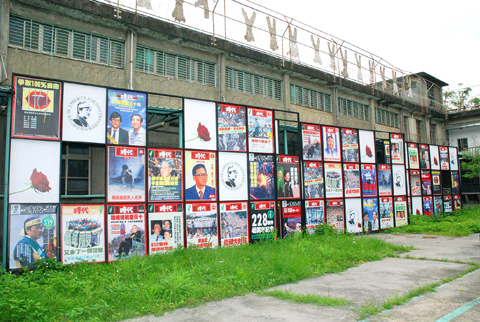Preserving infamous former prisons and turning them into museums may help to teach future generations important human rights lessons, speakers at a panel on prison museums said yesterday.
The panel — part of the Green Island Human Rights Arts Festival — was held yesterday by the Council for Cultural Affairs (CCA) at the Taiwan Human Rights Memorial in Jingmei (景美), Taipei.
The Jingmei human rights memorial park is home to the courtrooms where political prisoners were tried during the 1960s to the 1980s period of the Martial Law era, and the facilities where they were imprisoned.

PHOTO: CNA
Political prisoners from the former Jingmei martial law prison stayed in very small cells with toilets located inside the cells.
They were often tortured, abused and forced to work as cheap labor, former political prisoners said in a video shown prior to the beginning of the panel.
“It’s important to preserve these buildings so that people can be reminded of what once happened here — if we don’t know our history, it may repeat itself,” CCA vice-chairman Wu Chin-fa (吳錦發) told the audience.
“If we’re unaware of it, human rights abuses could continue to happen in any corner of society — maybe in different forms — even in a democracy,” he said.
Guest speaker, Rich Weideman, public affairs chief for the Golden Gate National Recreation Area in California, agreed that former prisons have important educational value.
He has worked as a tour guide at Alcatraz Island prison since 1980 and participated in the design of education curriculums about the prison.
Alcatraz was first used as a military base to protect San Francisco from attacks in the 1850s. It was turned into a military prison in 1909, and then a federal prison in 1934.
The prison was closed in 1963, and it was officially inaugurated as a tourist attraction in 1972.
“People have many misconceptions about prisons, because Hollywood movies and the media glamorized life in Alcatraz,” he said. “Therefore I think a tour of the prison presents a very good educational opportunity.”
To show what life on Alcatraz was really like, visitors follow in the steps of prisoners from the moment they arrived on the island. The tours are accompanied by voice recordings of former prisoners, guards and their families, telling their stories, Weideman said.
“It’s very important [for tourists] to get into the mindset of these prisoners — and some actually leave the place in tears,” he said.
“If what we do keeps even one kid out of prison, it’s worth the effort,” he said.
Park Goo-yong, a philosophy professor at South Korea’s Chonnam National University, and one of the planners of the May 18 Liberty Park in Gwanju, South Korea, shared similar views.
The May 18 incident happened in 1980 when tens of thousands of South Koreas demonstrated against military dictator Chun Doo-hwan — who had just taken control of the government following a coup — but were faced with a violent crackdown.
In order to commemorate the event, the May 18 Liberty Park was created in 1998 to preserve the martial-law courtroom and the military prisons.
“For many Koreans, the May 18 incident belongs to the past, and people only think about it every May,” Park said. “With the park and preservation of the historic space, we intend to educate our children about the history, so that they can learn about the core values of the uprising.”

Taiwan is stepping up plans to create self-sufficient supply chains for combat drones and increase foreign orders from the US to counter China’s numerical superiority, a defense official said on Saturday. Commenting on condition of anonymity, the official said the nation’s armed forces are in agreement with US Admiral Samuel Paparo’s assessment that Taiwan’s military must be prepared to turn the nation’s waters into a “hellscape” for the Chinese People’s Liberation Army (PLA). Paparo, the commander of the US Indo-Pacific Command, reiterated the concept during a Congressional hearing in Washington on Wednesday. He first coined the term in a security conference last

A magnitude 4.3 earthquake struck eastern Taiwan's Hualien County at 8:31am today, according to the Central Weather Administration (CWA). The epicenter of the temblor was located in Hualien County, about 70.3 kilometers south southwest of Hualien County Hall, at a depth of 23.2km, according to the administration. There were no immediate reports of damage resulting from the quake. The earthquake's intensity, which gauges the actual effect of a temblor, was highest in Taitung County, where it measured 3 on Taiwan's 7-tier intensity scale. The quake also measured an intensity of 2 in Hualien and Nantou counties, the CWA said.

The Overseas Community Affairs Council (OCAC) yesterday announced a fundraising campaign to support survivors of the magnitude 7.7 earthquake that struck Myanmar on March 28, with two prayer events scheduled in Taipei and Taichung later this week. “While initial rescue operations have concluded [in Myanmar], many survivors are now facing increasingly difficult living conditions,” OCAC Minister Hsu Chia-ching (徐佳青) told a news conference in Taipei. The fundraising campaign, which runs through May 31, is focused on supporting the reconstruction of damaged overseas compatriot schools, assisting students from Myanmar in Taiwan, and providing essential items, such as drinking water, food and medical supplies,

New Party Deputy Secretary-General You Chih-pin (游智彬) this morning went to the National Immigration Agency (NIA) to “turn himself in” after being notified that he had failed to provide proof of having renounced his Chinese household registration. He was one of more than 10,000 naturalized Taiwanese citizens from China who were informed by the NIA that their Taiwanese citizenship might be revoked if they fail to provide the proof in three months, people familiar with the matter said. You said he has proof that he had renounced his Chinese household registration and demanded the NIA provide proof that he still had Chinese